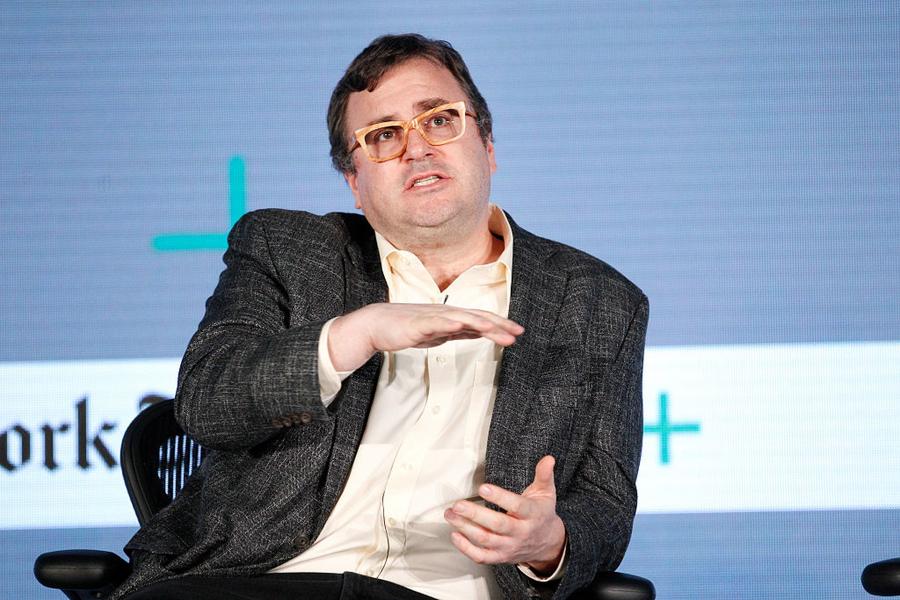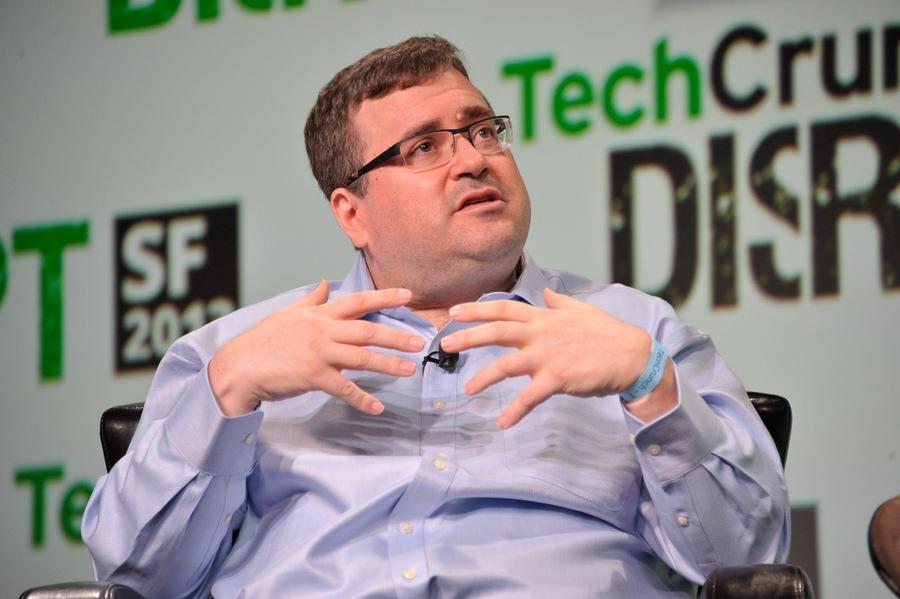What is Reid Hoffman's Net Worth?
Reid Hoffman is an American internet entrepreneur and venture capitalist who has a net worth of $3 billion. Reid Hoffman is best known as the co-founder of the online social network LinkedIn. He also co-founded the AI software company Inflection AI, and is a partner at the venture capital firm Greylock Partners, through which he is a prolific angel investor. Before his success with LinkedIn, Reid was a high-level executive at PayPal, ultimately rising to an Executive Vice President. At PayPal, Hoffman's responsibilities included all external relationships (including payments infrastructure), business development, international, government and legal. He was instrumental to the company's acquisition by eBay and responsible for partnerships with Intuit, Visa, MasterCard and Wells Fargo. Prior to joining PayPal in 1998, Hoffman was the founder of (failed) online dating site SocialNet, which some regard as the first online social network.
Reid Hoffman famously was one of the earliest investors in Facebook. He was also one of the earliest investor in his friend Mark Pincus' gaming company Zynga.
LinkedIn Acquisition
When Microsoft bought LinkedIn for $29 billion in 2016, Reid owned 14.5 million shares of the company. The Microsoft deal bought LinkedIn out at $192 per share so Reid's stake was worth $2.8 billion, pre-tax.

(Getty)
Early Life and Education
Reid Hoffman was born on August 5, 1967 in Palo Alto, California to William Jr. and Deanna, and was raised in Berkeley. Growing up, he was passionate about tabletop roleplaying games; at the age of 12, he had his first paid job as an editor at the Oakland-based game company Chaosium. As a teen, Hoffman went to the Putney School in Vermont, where he studied epistemology and farmed maple syrup. He went on to attend Stanford University, earning his BS in cognitive science and symbolic systems. Hoffman subsequently went to the University of Oxford's Wolfson College, from which he graduated with a MSt in philosophy in 1993.
Career Beginnings
Deciding to pursue an entrepreneurial career after college, Hoffman landed an internship at the Napa Valley winery Inglenook. Following that, he joined Apple Computer, and then Fujitsu. In 1997, Hoffman co-founded his first company, SocialNet.com. He subsequently became a member of the board of directors of PayPal as the company was being founded. In 2000, Hoffman left SocialNet.com to become the COO of PayPal. He was made responsible for the company's external relationships pertaining to business development, government, and payments infrastructure, among other areas. Hoffman was later promoted to executive vice president of PayPal.
In late 2002, Hoffman co-founded LinkedIn with a former college classmate, a former Fujitsu colleague, and two of his former SocialNet.com colleagues. The platform officially launched in May of 2003 as one of the first business-focused online social networks. LinkedIn grew substantially over the years; by late 2014, it had more than 332 million members from around the world, and eventually, it amassed 800 million members.
For the first four years of LinkedIn's operation, Hoffman was the company's founding CEO. He then became chairman and president of products, before becoming executive chairman in 2009. Two years after that, LinkedIn went public, with Hoffman owning a stake valued at $2.34 billion.
Investing
Beyond his entrepreneurship, Hoffman is known as one of the most prolific and successful angel investors in Silicon Valley. In 2010, he became a partner of the venture capital firm Greylock Partners, and made his first investment in the online lodging marketplace Airbnb. At Greylock, Hoffman invests in such areas as consumer services, social gaming, mobile, enterprise software, and social networks. He has invested in such companies as Digg; Tagged; Viki; TrialPay; Flickr; Kongregate; Edmodo; Swipely; SixApart; Coda; Blockstream; Neeva; and Entrepreneur First. Hoffman has also made numerous notable investments in transportation-oriented companies, including Nuro, Nauto, Convoy, Joby Aviation, and Aurora.

Steve Jennings/Getty Images
Speaking
Hoffman speaks frequently at public events. He has spoken at TED and XPrize Foundation conferences; Fast Forward's Accelerate Good Global; TechCrunch Disrupt; the Knight Foundation Symposium; and the Bloomberg Equality Summit. Hoffman also does lectures at such schools as Oxford, Harvard, Stanford, and MIT.
Writing
As an author, Hoffman co-wrote "The Start-Up of You: Adapt to the Future, Invest in Yourself, and Transform Your Career" with Ben Casnocha. Published in 2012, it became a New York Times and Wall Street Journal bestseller. Following this, Hoffman co-authored "The Alliance: Managing Talent in the Networked Age" with Casnocha and Chris Yeh; it too became a New York Times bestseller. Hoffman reunited with Yeh to co-write the 2018 book "Blitzscaling: The Lightning-Fast Path to Building Massively Valuable Companies." Beyond books, Hoffman has posted numerous essays on LinkedIn, and has penned op-eds for the Washington Post and Strategy+Business.
Podcasting
In 2017, Hoffman launched his podcast "Masters of Scale," on which he brings up seemingly impractical business theories and proves them out through conversations with successful entrepreneurs. Episodes have featured such guests as Land O'Lakes CEO Beth Ford; Spanx's Sara Blakely; Airbnb's Brian Chesky; fashion designer Tory Burch; and TaskRabbit's Stacy Brown-Philpot.
Personal Life and Philanthropy
Hoffman married his wife Michelle Yee in 2004; together, they reside in Seattle, Washington.
Substantially involved in philanthropy, Hoffman serves on the boards of such nonprofits as Kiva and Endeavor, as well as the think tank New America. He has also helped fund such organizations as Code for America, Alloy, and OpenAI, and has made donations to the Chan Zuckerberg Initiative, HimforHer, All Raise, and Opportunity@Work, among other groups. In the sphere of politics, Hoffman co-founded the pro-immigration lobbying group FWD.us; donated to the Mayday PAC and the campaigns of Democratic candidates such as David Chiu and Matt Dunne; and is a member of the Council on Foreign Relations.
/2010/07/GettyImages-180291007.jpg)
/2010/07/Mark-Pincus.jpg)
/2010/07/GettyImages-456865726.jpg)
/2020/07/Jeff-Weiner.jpg)
/2020/05/Chamath-Palihapitiya.jpg)
/2010/05/Peter-Thiel.jpg)
/2021/10/John-Boyega.jpg)
/2010/11/josh.jpg)
/2022/05/Nayib-Bukele.jpg)
/2010/11/russell-armstrong.png)
/2013/07/courtney-henggeler.jpg)
/2021/12/Lauren-Sanchez.jpg)
/2020/10/cate.jpg)
/2018/04/GettyImages-942450576.jpg)
/2021/08/bert-kreisher.jpg)
/2021/09/tom-segura.jpg)
/2023/09/john-mars.png)
/2010/07/GettyImages-180291007.jpg)
/2010/05/Peter-Thiel.jpg)
/2010/07/Mark-Pincus.jpg)
/2010/07/GettyImages-456865726.jpg)
/2021/01/GettyImages-180288501.jpg)
/2020/05/Chamath-Palihapitiya.jpg)
/2014/04/Jim-Breyer.jpg)
/2017/06/parker.jpg)